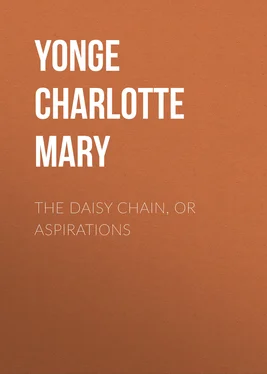Charlotte Yonge - The Daisy Chain, or Aspirations
Здесь есть возможность читать онлайн «Charlotte Yonge - The Daisy Chain, or Aspirations» — ознакомительный отрывок электронной книги совершенно бесплатно, а после прочтения отрывка купить полную версию. В некоторых случаях можно слушать аудио, скачать через торрент в формате fb2 и присутствует краткое содержание. Жанр: foreign_prose, literature_19, Европейская старинная литература, foreign_antique, на английском языке. Описание произведения, (предисловие) а так же отзывы посетителей доступны на портале библиотеки ЛибКат.
- Название:The Daisy Chain, or Aspirations
- Автор:
- Жанр:
- Год:неизвестен
- ISBN:нет данных
- Рейтинг книги:5 / 5. Голосов: 1
-
Избранное:Добавить в избранное
- Отзывы:
-
Ваша оценка:
- 100
- 1
- 2
- 3
- 4
- 5
The Daisy Chain, or Aspirations: краткое содержание, описание и аннотация
Предлагаем к чтению аннотацию, описание, краткое содержание или предисловие (зависит от того, что написал сам автор книги «The Daisy Chain, or Aspirations»). Если вы не нашли необходимую информацию о книге — напишите в комментариях, мы постараемся отыскать её.
The Daisy Chain, or Aspirations — читать онлайн ознакомительный отрывок
Ниже представлен текст книги, разбитый по страницам. Система сохранения места последней прочитанной страницы, позволяет с удобством читать онлайн бесплатно книгу «The Daisy Chain, or Aspirations», без необходимости каждый раз заново искать на чём Вы остановились. Поставьте закладку, и сможете в любой момент перейти на страницу, на которой закончили чтение.
Интервал:
Закладка:
Miss Rivers took up some brown leaves which she was cutting out with scissors, and shaping. “Our holiday work,” said Mrs. Larpent, in answer to the inquiring look of Norman’s eyes. “Meta has been making a drawing for her papa, and is framing it in leather-work. Have you ever seen any?”
“Never!” and Norman looked eagerly, asking questions, and watching while Miss Rivers cut out her ivy leaf and marked its veins, and showed how she copied it from nature. He thanked her, saying, “I wanted to learn all about it, for I thought it would be such nice work for my eldest sister.”
A glance of earnest interest from little Meta’s bright eyes at her governess, and Mrs. Larpent, in a kind, soft tone that quite gained his heart, asked, “Is she the invalid?”
“Yes,” said Norman. “New fancy work is a great gain to her.”
Mrs. Larpent’s sympathetic questions, and Meta’s softening eyes, gradually drew from him a great deal about Margaret’s helpless state, and her patience, and capabilities, and how every one came to her with all their cares; and Norman, as he spoke, mentally contrasted the life, untouched by trouble and care, led by the fair girl before him, with that atmosphere of constant petty anxieties round her namesake’s couch, at years so nearly the same.
“How very good she must be,” said little Meta, quickly and softly; and a tear was sparkling on her eyelashes.
“She is indeed,” said Norman earnestly. “I don’t know what papa would do but for her.”
Mrs. Larpent asked kind questions whether his father’s arm was very painful, and the hopes of its cure; and he felt as if she was a great friend already. Thence they came to books. Norman had not read for months past, but it happened that Meta was just now reading Woodstock, with which he was of course familiar; and both grew eager in discussing that and several others. Of one, Meta spoke in such terms of delight, that Norman thought it had been very stupid of him to let it lie on the table for the last fortnight without looking into it.
He was almost sorry to see his father and Mr. Rivers come in, and hear the carriage ordered, but they were not off yet, though the rain was now only Scotch mist. Mr. Rivers had his most choice little pictures still to display, his beautiful early Italian masters, finished like illuminations, and over these there was much lingering and admiring. Meta had whispered something to her governess, who smiled, and advanced to Norman. “Meta wishes to know if your sister would like to have a few flowers?” said she.
No sooner said than done; the door into the conservatory was opened, and Meta, cutting sprays of beautiful geranium, delicious heliotrope, fragrant calycanthus, deep blue tree violet, and exquisite hothouse ferns; perfect wonders to Norman, who, at each addition to the bouquet, exclaimed by turns, “Oh, thank you!” and, “How she will like it!”
Her father reached a magnolia blossom from on high, and the quick warm grateful emotion trembled in Dr. May’s features and voice, as he said, “It is very kind in you; you have given my poor girl a great treat. Thank you with all my heart.”
Margaret Rivers cast down her eyes, half smiled, and shrank back, thinking she had never felt anything like the left-handed grasp, so full of warmth and thankfulness. It gave her confidence to venture on the one question on which she was bent. Her father was in the hall, showing Norman his Greek nymph; and lifting her eyes to Dr. May’s face, then casting them down, she coloured deeper than ever, as she said, in a stammering whisper, “Oh, please—if you would tell me—do you think—is papa very ill?”
Dr. May answered in his softest, most reassuring tones: “You need not be alarmed about him, I assure you. You must keep him from too much business,” he added, smiling; “make him ride with you, and not let him tire himself, and I am sure you can be his best doctor.”
“But do you think,” said Meta, earnestly looking up—“do you think he will be quite well again?”
“You must not expect doctors to be absolute oracles,” said he. “I will tell you what I told him—I hardly think his will ever be sound health again, but I see no reason why he should not have many years of comfort, and there is no cause for you to disquiet yourself on his account—you have only to be careful of him.”
Meta tried to say “thank you,” but not succeeding, looked imploringly at her governess, who spoke for her. “Thank you, it is a great relief to have an opinion, for we were not at all satisfied about Mr. Rivers.”
A few words more, and Meta was skipping about like a sprite finding a basket for the flowers—she had another shake of the hand, another grateful smile, and “thank you,” from the doctor; and then, as the carriage disappeared, Mrs. Larpent exclaimed, “What a very nice intelligent boy that was.”
“Particularly gentlemanlike,” said Mr. Rivers. “Very clever—the head of the school, as his father tells me—and so modest and unassuming—though I see his father is very proud of him.”
“Oh, I am sure they are so fond of each other,” said Meta: “didn’t you see his attentive ways to his father at luncheon! And, papa, I am sure you must like Dr. May, Mr. Wilmot’s doctor, as much as I said you would.”
“He is the most superior man I have met with for a long time,” said Mr. Rivers. “It is a great acquisition to find a man of such taste and acquirements in this country neighbourhood, when there is not another who can tell a Claude from a Poussin. I declare, when once we began talking, there was no leaving off—I have not met a person of so much conversation since I left town. I thought you would like to see him, Meta.”
“I hope I shall know the Miss Mays some time or other.”
“That is the prettiest little fairy I ever did see!” was Dr. May’s remark, as Norman drove from the door.
“How good-natured they are!” said Norman; “I just said something about Margaret, and she gave me all these flowers. How Margaret will be delighted! I wish the girls could see it all!”
“So you got on well with the ladies, did you?”
“They were very kind to me. It was very pleasant!” said Norman, with a tone of enjoyment that did his father’s heart good.
“I was glad you should come in. Such a curiosity shop is a sight, and those pictures were some of them well worth seeing. That was a splendid Titian.”
“That cast of the Pallas of the Parthenon—how beautiful it was—I knew it from the picture in Smith’s dictionary. Mr. Rivers said he would show me all his antiques if you would bring me again.”
“I saw he liked your interest in them. He is a good, kind-hearted dilettante sort of old man; he has got all the talk of the literary, cultivated society in London, and must find it dullish work here.”
“You liked him, didn’t you?”
“He is very pleasant; I found he knew my old friend, Benson, whom I had not seen since we were at Cambridge together, and we got on that and other matters; London people have an art of conversation not learned here, and I don’t know how the time slipped away; but you must have been tolerably tired of waiting.”
“Not to signify,” said Norman. “I only began to think he must be very ill; I hope there is not much the matter with him.”
“I can’t say. I am afraid there is organic disease, but I think it may be kept quiet a good while yet, and he may have a pleasant life for some time to come, arranging his prints, and petting his pretty daughter. He has plenty to fall back upon.”
“Do you go there again?”
“Yes, next week. I am glad of it. I shall like to have another look at that little Madonna of his—it is the sort of picture that does one good to carry away in one’s eye. Whay! Stop. There’s an old woman in here. It is too late for Fordholm, but these cases won’t wait.”
Читать дальшеИнтервал:
Закладка:
Похожие книги на «The Daisy Chain, or Aspirations»
Представляем Вашему вниманию похожие книги на «The Daisy Chain, or Aspirations» списком для выбора. Мы отобрали схожую по названию и смыслу литературу в надежде предоставить читателям больше вариантов отыскать новые, интересные, ещё непрочитанные произведения.
Обсуждение, отзывы о книге «The Daisy Chain, or Aspirations» и просто собственные мнения читателей. Оставьте ваши комментарии, напишите, что Вы думаете о произведении, его смысле или главных героях. Укажите что конкретно понравилось, а что нет, и почему Вы так считаете.












